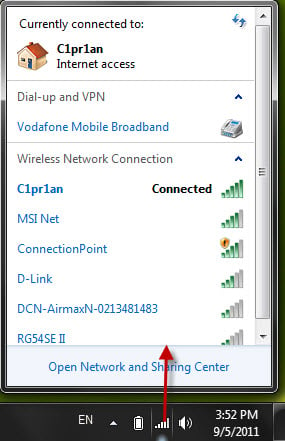
- 3Com (3C562C-3C563C) EtherLink III LAN+336 Modem PC Card Parent 2.10.4000.114.
- The Asset to Vendor Network for Power Utilities (A2V) announced the group’s first new partner. Founded by Fortress Information Security (Fortress) and American Electric Power (AEP), A2V was.
Network Equipment Transforming the way the world connects through open networking solutions, SMC Networks’ can assist you with our sister company, Edge-Core, networking products. From wireless to enterprise backbone network switches, Edge-Core and SMC can deliver the networking infrastructure products your organization needs to be more.
| RTL8106E | PCIVEN_10EC&DEV_8136&REV_07 PCIVEN_10EC&DEV_8136&SUBSYS_813610EC&REV_07 |
| RTL8125 | PCIVEN_10EC&DEV_8125&REV_00 PCIVEN_10EC&DEV_8125&SUBSYS_812510EC&REV_00 |
| RTL8131 | PCIVEN_10EC&DEV_8131 PCIVEN_10EC&DEV_8131&REV_0 PCIVEN_10EC&DEV_8131&SUBSYS_813110EC&REV_01 PCIVEN_10EC&DEV_8136&SUBSYS_83A01043&REV_01 |
| RTL8150 | USBVID_0BDA&PID_8150 |
| RTL8152 | USBVID_0BDA&PID_8152&REV_2000 |
| RTL8153 | USBVID_0BDA&PID_8153&REV_3000 USBVID_17EF&PID_304F&REV_3000 USBVID_17EF&PID_7205&REV_3000 |
| RTL8155 | USBVID_0BDA&PID_8155 USBVID_0BDA&PID_8155&REV_3000 USBVID_0BDA&PID_8155&REV_3001 USBVID_0BDA&PID_8155&REV_3002 USBVID_0BDA&PID_8155&REV_3003 USBVID_0BDA&PID_8155&REV_3004 USBVID_0BDA&PID_8155&REV_3005 USBVID_0BDA&PID_8155&REV_3008 USBVID_0BDA&PID_8155&REV_300E USBVID_0BDA&PID_8155&REV_300F USBVID_0BDA&PID_8155&REV_30F0 USBVID_0BDA&PID_8155&REV_30F1 USBVID_0BDA&PID_8155&REV_30F2 USBVID_0BDA&PID_8155&REV_30F3 USBVID_0BDA&PID_8155&REV_30F4 USBVID_0BDA&PID_8155&REV_30F5 USBVID_0BDA&PID_8155&REV_30F8 USBVID_0BDA&PID_8155&REV_30FE USBVID_0BDA&PID_8155&REV_30FF |
| RTL8156 | USBVID_056E&PID_4017&REV_3100 USBVID_065F&PID_3200&REV_3104 USBVID_0B05&PID_18D1&REV_3005 USBVID_0B05&PID_1976&REV_3105 USBVID_0BDA&PID_8156&REV_3000 USBVID_0BDA&PID_8156&REV_3001 USBVID_0BDA&PID_8156&REV_3002 USBVID_0BDA&PID_8156&REV_3003 USBVID_0BDA&PID_8156&REV_3004 USBVID_0BDA&PID_8156&REV_3005 USBVID_0BDA&PID_8156&REV_3008 USBVID_0BDA&PID_8156&REV_300E USBVID_0BDA&PID_8156&REV_300F USBVID_0BDA&PID_8156&REV_30F0 USBVID_0BDA&PID_8156&REV_30F1 USBVID_0BDA&PID_8156&REV_30F2 USBVID_0BDA&PID_8156&REV_30F3 USBVID_0BDA&PID_8156&REV_30F4 USBVID_0BDA&PID_8156&REV_30F5 USBVID_0BDA&PID_8156&REV_30F8 USBVID_0BDA&PID_8156&REV_30FE USBVID_0BDA&PID_8156&REV_30FF USBVID_0BDA&PID_8156&REV_3100 USBVID_0BDA&PID_8156&REV_3101 USBVID_0BDA&PID_8156&REV_3102 USBVID_0BDA&PID_8156&REV_3103 USBVID_0BDA&PID_8156&REV_3104 USBVID_0BDA&PID_8156&REV_3105 USBVID_0BDA&PID_8156&REV_3108 USBVID_0BDA&PID_8156&REV_310E USBVID_0BDA&PID_8156&REV_310F USBVID_0BDA&PID_8156&REV_31F0 USBVID_0BDA&PID_8156&REV_31F1 USBVID_0BDA&PID_8156&REV_31F2 USBVID_0BDA&PID_8156&REV_31F3 USBVID_0BDA&PID_8156&REV_31F4 USBVID_0BDA&PID_8156&REV_31F5 USBVID_0BDA&PID_8156&REV_31F8 USBVID_0BDA&PID_8156&REV_31FE USBVID_0BDA&PID_8156&REV_31FF USBVID_0DF4&PID_0025&REV_3100 USBVID_1A56&PID_3100 USBVID_1A56&PID_3100&REV_3100 USBVID_1A56&PID_3100&REV_310E USBVID_1A56&PID_3100&REV_310F USBVID_2001&PID_B301&REV_3100 USBVID_20F4&PID_E02B&REV_3004 USBVID_2D01&PID_0032&REV_3100 USBVID_310E&PID_0062&REV_3100 |
| RTL8401E | PCIVEN_10EC&DEV_8136&REV_04 PCIVEN_10EC&DEV_8136&SUBSYS_813610EC&REV_04 |
| RTL8402 | PCIVEN_10EC&DEV_8136&REV_06 PCIVEN_10EC&DEV_8136&SUBSYS_813610EC&REV_06 |
| RTL8411 | PCIVEN_10EC&DEV_8168&REV_0A PCIVEN_10EC&DEV_8168&SUBSYS_816810EC&REV_0A |
The process for controlling user access to a company’s resources has changed with the evolution of the Internet and introduction of more cloud-based services. Not only do employees access an organization’s IT infrastructure, but third party contractors, vendors, and temporary workers also require access.


The Modern Company: Hiring the Best Talent
An organization’s structure is no longer simple since it’s employees aren’t required to be on-premise to access the resources they need to do their jobs. This way of working complicates personnel strategy, since companies now also leverage contractors and vendors from around the world. On the upside: Today’s global economy allows organizations to find and hire the best talent. But the modern company structure also creates an IT challenge.
The Challenge: Securely Controlling User Access
In today’s global world, IT organizations must securely control access to their internal resources, which include devices, applications, data, and even the network itself. IT admins first need to determine the best way to provide the appropriate levels of access to employees, contractors and vendors, without compromising security. Over the last few years, a number of major security breaches have occurred due to improper third-party access controls.. The most significant security breach was the Target breach. A third party was compromised and so was their access into Target’s network, resulting in millions of credit cards being stolen.
The Old Way: Keeping Everything On-Premise
In the past, most companies used Microsoft® Active Directory® and OpenLDAP™, two one-premise software solutions that serve as directories. These directory services fundamentally controlled user access. IT admins would populate the directories with the users within the organization and set their access rights. As a result, those user stores controlled who had access to what devices, applications, and networks. Yet, some IT admins using AD or OpenLDAP are reluctant to put temporary or part-time workers into their core directory service solution, because there is often concerns about co-mingling users, inadvertently providing higher levels of access, and compliance issues. As a result, third parties, like contractors and vendors, and their access rights are often not managed well.
The New Solution: Leveraging Directory-as-a-Service

Download Free Wireless Network Adapter Driver
The past is the past for a reason, especially in technology. Old ways of working are outdated and limiting. Nowadays, IT admins can leverage a better solution: JumpCloud® Directory-as-a-Service® (DaaS). Directory-as-a-Service is a centralized cloud-based directory service that will connect users to a variety of devices, applications, and networks. This solution works for modern, global companies, because third parties are managed inside of DaaS and connected, depending on IT protocols, to the on-premises directory service or kept completely separate. Users are placed into the directory database and then added to the IT resources that they need to access. Because access is easy to grant and terminate, third parties can be given only the access they need, even if it’s only for a few hours. The advantages of Directory-as-a-Service include the ability to easily manage third parties outside of the organization’s network, the ability to manage access cross-platform, and the integration with cloud infrastructure and services.
Wifi Card Driver Download

Wireless Network Card Driver
Controlling contractor and vendor access to your IT resources doesn’t need to be time consuming, difficult, or risky. By finding the right platform – Directory-as-a-Service – IT admins can generate the productivity gains they need while also keeping the network secure. Drop us a note to learn more about Directory-as-a-Service, or give JumpCloud a try for yourself. The first 10 users are free forever.
Comments are closed.